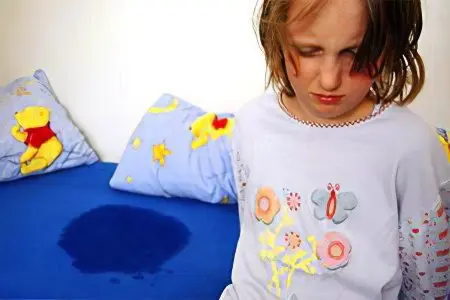
A child cannot perceive the world harmoniously if he suffers from urinary incontinence. This pathology, its causes and features of treatment, are on a special account in modern pediatrics. The international classification of diseases defines enuresis of inorganic nature as persistent involuntary daytime and (or) nighttime urination that does not correspond to the psychological age of children. This problem becomes most important when the child is 5 years old.
A characteristic sign of primary enuresis is that the child does not have and did not have control over the process of urination. If the baby stably controlled the emptying of the bladder for at least six months in a row, and then lost this ability, enuresis is considered secondary (acquired or recurrent). The development of secondary enuresis is significantly influenced by urological or neurological factors.
In the age category from 4 to 15 years, according to medical statistics, enuresis is occasionally or constantly observed in 20-30% of children. In about 8-10% of cases, daytime urinary incontinence persists into adolescence and adulthood. This circumstance worsens the quality of life, requires long-term treatment, and leads to the development of psychopathologies. Enuresis is of great social importance, as in 60% of families parents consider it a serious problem, about a third punish children for urinary incontinence. In most cases, it is very difficult or impossible to identify the cause of the pathology. It is believed that nocturnal enuresis has a polyetiological nature, that is, several factors take part in its development.
Causes of enuresis in children

There are several hypotheses about the causes contributing to the development of enuresis. Assumptions are confirmed by studies of specialists in various fields of medicine (urology, pediatrics, neuropathology, psychology).
The most common causes of enuresis are:
Immaturity of the central nervous system. Delayed maturation of the central nervous system occurs due to pathologies of pregnancy and childbirth, traumatic brain injuries, and neuroinfections. Due to immaturity, the regulation of the functions of various body systems, including urination, is disrupted. In support of this hypothesis, studies on enuresis provide the following data: 10-15% of children get rid of urinary incontinence spontaneously, without any treatment.
Trouble in the functioning of the urinary system. Enuresis may be the only symptom of pathologies such as bladder dysfunction, vesicoureteral reflex, myelodysplasia, overactive bladder.
Pathological phenomenon of sleep. Sleeping too deeply can cause involuntary urination.
Violation of the secretion of vasopressin, nocturnal polyuria. Decreased antidiuretic hormone production leads to the production of large volumes of urine at night, while normally increased secretion of vasopressin reduces nocturnal urine production. Approximately 3/4 of children with bedwetting have nocturnal polyuria.
Наследственность. Genetic predisposition is due to the autosomal dominant type of inheritance of a similar pathology in 75% of the direct relatives of a child with enuresis.
Stress and socio-psychological background. A child who has experienced severe stress or a long-term traumatic situation during the first 4-6 years of life subconsciously responds to this with urinary incontinence in protest. This hypothesis is supported by the fact that after the cure of enuresis, a positive dynamics of the mental state is observed.
Comments by Dr. Komarovsky on the causes of childhood enuresis:
Restriction of drinking for the treatment of enuresis
Decreasing the amount of fluid you drink is one way to reduce the chance of bedwetting.
The drinking regimen of a child suffering from enuresis should be built according to the following scheme:
Liquid drunk before 12.00 – 40%;
Liquid drunk before 17.00 – 40%;
Liquid drunk after 17.00 – 20% of the total volume.
An important note – the liquid drunk in the evening should not contain caffeine (tea, coffee).
Dr. Komarovsky’s comments on drinking restriction:









